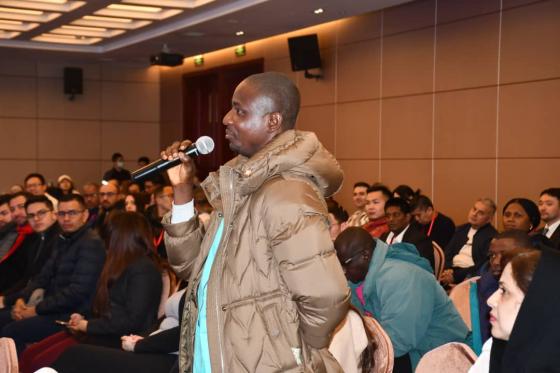China IPCC Program Kicks-off in Beijing

Journalist David Menjor at the IPCC program in Beijing, China
— Daily Observer’s David S. Menjor graces event
The China International Press Communications Center Program kicked off in Beijing, marking the first of two gatherings scheduled for 2024. David S. Menjor, a reporter for the Daily Observer, is among the attendees at the event. Menjor traveled from Liberia and arrived in Beijing on February 28 to participate in this program, which involves media practitioners from various countries across Africa, Europe, the United Kingdom, Asia, the Pacific, and Latin America.
The CIPCC serves as a platform for media exchanges, aiming to provide foreign journalists with firsthand knowledge of China and its people. Menjor, along with journalists from other countries, will engage in workshops, training sessions, and cultural activities to gain a deeper understanding of China's history, traditions, and current affairs.
For four consecutive months (March to June) Menjor and colleagues will participate in a series of workshops and training sessions as well as learn about Chinese cultural activities to gain a deeper understanding of the country’s history, tradition, and current affairs.
Besides Liberia, other countries represented in China include The Gambia, Sierra Leone, Burundi, Namibia, Nigeria, and Malawi. Others are Botswana, Cape Verde, Indonesia, Bangladesh, Comoros, Egypt, and Pakistan, among others.
Like his other colleagues gracing activities of the first component of the CIPCC-2024, Menjor will have the opportunity to tell the Liberian story of the media community and his personal experience being a journalist from an economically struggling country like Liberia.
Participants will also learn about China’s socio-economic development, diplomacy, science, and technology during the four-month program from March to June.
The program director, Yu Lei, at the orientation event, welcomed the foreign journalists and emphasized the importance of understanding China’s perspective on global civilization and promoting mutual coexistence.
Lei said China is a great country and that it seeks at all times to share its unique views about the world's civilization and how mutual coexistence is possible once there’s the right education for all, irrespective of color, religion, or nationality among others.
He cautioned against prejudice and discrimination, which are forces of destruction of a unifying and cohesive global society.
He noted that Two Sessions seeks to promote the Chinese people’s appetite for political leadership, economic growth, development, science, and technology.
Menjor and other participants had the opportunity to ask questions about China's governance approach and democracy within a Communist system.
In response, Lei noted that every governance approach is better defined, understood, and appreciated by those whom it serves, benefits, and advances from a low standard of living to a higher or better one rather than its critics who sit afar and term everything worthless.
The Chinese veteran educator and diplomacy expert added that the Two Sessions, although headed by the National People’s Congress (NPC) to which the President belongs, the people of all groups from across the provinces have a part each to play in electing leaders who go about deciding by yet another vote all those who are to work in central government.
Lei mentioned the economy, governance, technology, and health as four of the six hot topics of Two Sessions each time there’s an assembly.
At the orientation event, discussions covered China’s political governance system, the “Two Sessions,” economic growth, development, and technology.

